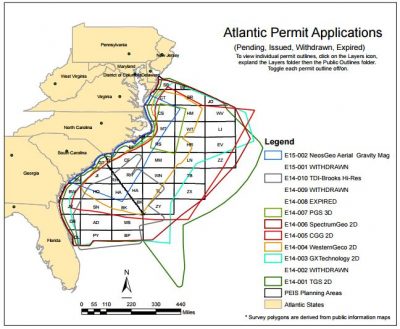
Reprinted from the Tideland News
Offshore leases for oil and natural gas off the N.C. coast are almost surely off the table through at least 2022, but seismic testing is not, and conservation groups are waiting to see if they’ll need to continue to fight.
Supporter Spotlight
The Obama administration’s decision to remove the East Coast from the next proposed offshore leasing plan would seem to relieve the immediate need to blast sound waves through the ocean floor to find likely sources of fossil fuels. But none of the companies that have sought the seismic permits have withdrawn their applications with the federal Bureau of Ocean Energy Management, or BOEM, yet.

“We haven’t received any indication yet that they plan to do that (withdraw),” John Filostrat, an agency spokesman said recently. “They might well just want to see what’s out there.”
As a result, opponents of the testing are in wait-and-see mode. But they’re hoping, and even doing a little planning.
“Now that offshore drilling won’t be considered in the Atlantic for years, there is absolutely no reason to move forward with seismic air gun blasting, which would put our fisheries and marine mammals in harm’s way,” said Claire Douglass, spokesperson for Oceana, the international conservation group that led the opposition against including the East Coast in the proposed leasing plan.
But, she added, Oceana is still pondering what to do, and is working behind the scenes, talking to federal officials and members of Congress. Some members, including Rep. Walter B. Jones, a Republican who represents coastal North Carolina, have already opposed the tests.
Supporter Spotlight

Currently, eight applications to conduct seismic testing are winding through the federal permitting process. The National Marine Fisheries Service, part of NOAA, is considering issuing authorizations that will allow the ships used for the testing to harm or harass, or “take” in language of the law, whales and other animals protected under federal laws.
While there have been reports that NMFS could act within weeks on some of those permit applications, Filostrat said it’s also possible that those decisions might not be made “until summer or even later in the year.”
North Carolina has already determined that four permit applications are consistent with the state’s coastal-management laws. Positive “consistency reviews” are needed before NMFS and BOEM reviews could begin. The N.C. Division of Coastal Management granted in April 2015 the permits for Spectrum Geo and GX Technology. Within two months, the division approved CGG Services and TGS for seismic surveying.
One other, TDI-Brooks, didn’t require a consistency determination because the firm uses sonar, not seismic guns.

Many of the most prominent marine mammal scientists in the world, including Doug Nowacek of the Duke University Marine Laboratory in Beaufort, have argued against seismic testing, which they believe can disrupt the mammals’ communications and alter migration patterns, feeding and, potentially, even mating. For some mammals, such as the endangered right whale, those disruptions could be devastating to the population.
Nowacek said recently that he doesn’t foresee “whales and dolphins dying and floating to the surface and washing ashore” if the testing occurs. He remains worried, though, about the considerable number of incidental takes typically allowed as a part of the practice elsewhere.
He’s especially worried about the right whales, and that although the now-dropped East Coast drilling plan banned wells inside 50 miles, seismic testing would be allowed within three miles of shore, plenty close enough to cause problems for the dolphins that frolic in our waters.
Two regional fishery management councils, the Mid-Atlantic and South Atlantic, have also expressed great concerns in official letters to BOEM, saying testing would affect benthic ecosystems, fish habitat and fishermen. The councils, combined, manage fisheries in federal waters, from three to 200 miles offshore, along most of the East Coast.
The industry has countered that there is no scientific evidence that directly links seismic sound waves to the deaths, stranding or other harm to whales and other marine creatures. It notes that it has conducted similar tests around the world with few incidences.
Nowacek, who through his work has close ties to people in the oil industry, doubts the testing firms will proceed, but concedes there’s no way to know for sure.

“It’s hard to imagine the oil companies paying for it, when (Atlantic) drilling is out of the 2017-22 plan and there’s no guarantee it will be in the next plan,” he said. “The (testing) companies could do it on their own, but who are they going to sell it (the resulting data) to?”
Filostrat said there are some potential buyers – the data can be used to help site offshore wind turbines, to locate sand deposits for mining and beach projects and for pure science – but said oil companies might be interested anyway, because they think in times much longer than five or even 10 years. Conceivably, they might pay for the data and then hold on to it until the times change and there is more demand and support for drilling.
Congress, he noted, could even mandate that the East Coast be placed back in the 2017-22 plan. And a new president who takes office in January 2017 could also do that or could simply put it back in the next plan.
Douglass said that while Oceana was grateful the Obama administration listened to coastal communities on the drilling issue, “I hope they will continue to listen and stop seismic air gun blasting in the Atlantic.”
Forty-three East Coast local governments adopted resolutions opposing seismic testing, she said, and 52 adopted resolutions against testing and drilling.
Filostrat said that no matter what happens next, the process, so far, has worked well.
“Dealing with the public was good and informative,” he said. “A lot of smart, well-informed and concerned residents made their voices heard. I personally went to at least a dozen public meetings, and the commitment was impressive. In the end, the (U.S.) Interior (Department) Secretary (Sally Jewell) made a tough call.”
The official interior department press release explained it this way: “Many factors were considered in the decision to remove this sale from the 2017-2022 program including: significant potential conflicts with other ocean uses such as the Department of Defense and commercial interests; current market dynamics; limited infrastructure; and opposition from many coastal communities.”
Learn More
- Science: A Review of the Impacts of Seismic Air Gun Surveys on Marine Life
- BOEM draft environmental study
This story is provided courtesy of the Tideland News, a weekly newspaper in Swansboro. Coastal Review Online is partnering with the Tideland to provide readers with more environmental and lifestyle stories of interest about our coast. You can read other stories about the Swansboro area here.







